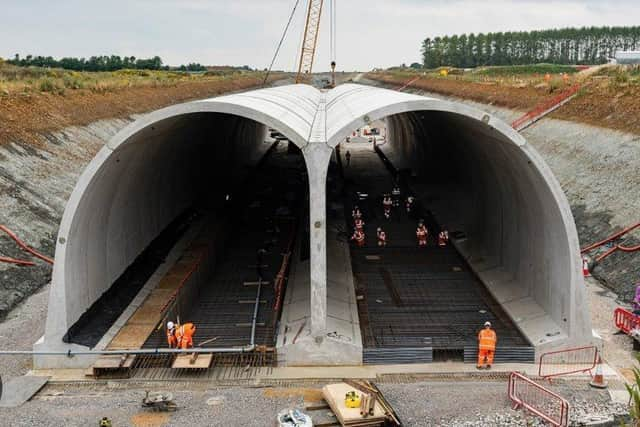HS2 – RIP or TBC?
and live on Freeview channel 276
That the project should be the subject of the PM’s commentary has, of course, prompted some to speculate that there is a particular reason for re-engaging with a subject which has generally been seen as being so divisive. Some will say that it heralds the possible announcement of an early general election. Equally, some will say that by getting tough subjects out in the harsh light of public and media comment now the government is buying as much time as it can to grasp a variety of nettles and be seen to be doing something constructive until the ballot boxes get dusted off and sent out to polling stations across the United Kingdom once more. Whatever the viewpoints, surely all would agree that there is good logic to be found in reviewing costs and establishing the benefits of ploughing on, or holding back further spend if not outright cancellation of those costs prove too onerous. But is HS2 the ultimate Grand Designs project and will Kevin McCloud be appearing with a Channel 4 camera crew at some point?
Where the project has already had years of physical development there will now be doubt about what happens next and at what cost. For those where HS2 might now not reach – at least for the time being - there will be concerns that they might have been overlooked. Here in Northamptonshire the physical effects of the project are minimal, and I will confess to having taken almost no interest in it beyond occasionally driving past some of the works going on as I did a few weeks ago. The scale of the work going on to the south of Northamptonshire is truly huge though. The scale of the costs is huge too, in terms of the materials being used, the amount of new plant and machinery which has been commissioned to do the work and, as a result, the money that the project has generated for those firms producing the machinery and those actually employed on the project on site. Compensation payments for people forced to move out of the way of HS2 has run into many tens of millions too, and if you multiply that across all the sites currently being worked on, those costs – are nothing less than gargantuan.
Advertisement
Hide AdAdvertisement
Hide AdBut ultimately is it worth that cost to have our arterial route journeys shortened by half an hour or so? Is London really still the epicentre for public transport and what is the project writeback timescale? Before the first bulldozer blade or digger bucket ever started to tear up the countryside people had been asking if the benefits outweighed the costs. The pandemic then caused a seismic shift in mass transport as people moved to a new model of working. Most of the nation is irrevocably in love with its cars and the freedoms that they bring. What has been the shift in the proportion of the public using public transport post-pandemic? And might not HS2 money be better used to repair and improve the existing transport network of road and rail which is now woefully inadequate and underinvested? In the 70s and 80s I watched as the Hunsbury estates sprang up alongside what we had initially called ‘The High Speed Road’. The A45 bypass around Northampton was built through the meadows and fields between my home village of Wootton and our near neighbours in Collingtree - it was our local equivalent of HS2 for cars. Undeniably it made the journey between the M1 and the East quicker than it had been, easing congestion into the county town and opening up routes for trade and public access to the ports of Harwich and the East Coast – but now and with the day-to-day pressures placed on it, the A45 is showing its age. Even with recent resurfacing of parts of the road surface there are many potholes which remain as winter beckons. Presumably they will remain for some time to come too, being deemed to be less pressing or too costly to tackle now.


All of which brings me back to HS2. If the government is going to cancel the northern phase of the project and finish it at Birmingham, presumably there will be huge costs to be dealt with not only from the civil engineering still to be completed but also associated with shutting down, however permanently. Will the budget earmarked for the project be redeployed elsewhere to improve the public transport network perhaps in the North of the country that HS2 doesn’t reach, or just not spent at all because the country’s pockets aren’t deep enough? Couldn’t HS2 money be redeployed to local councils where there is greater awareness of local need? That’s a different question and with huge political overtones not only for Westminster, but at local unitary level too, where there will also be elections before very much longer. How far is HS2 now a can to be kicked down the road, or a hot potato to be passed as quickly as possible to prevent burns to the holder? And what will the next administration (whatever its hue) do with what is a hugely vexed subject anyway? Until the manifestos come out, we’re perhaps at the mercy of soundbite politics - and there’s certainly time for any individual to add their tuppence to the pot.
For me, HS2 is a project that the nation could have done without from the start. The expenditure could have been far better placed nationwide delivering local solutions to existing problems because those problems will still exist and be both more pressing and costly to put right before HS2 is ever complete. The needs of the nation have changed in the recent past - by all means invest in the future infrastructure of the country but get the infrastructure of the present right before you do.